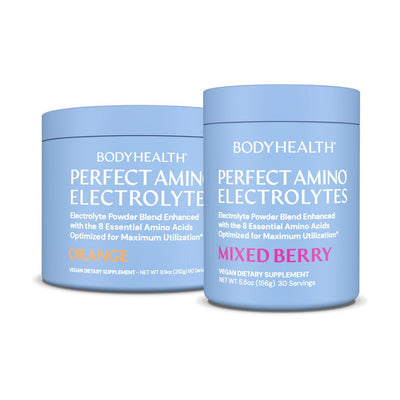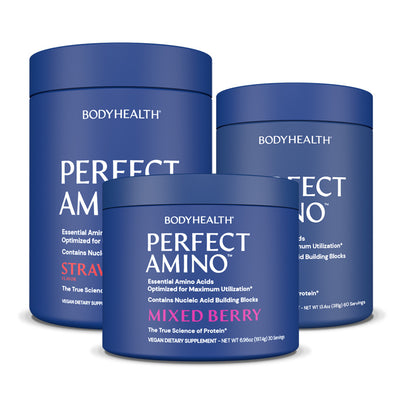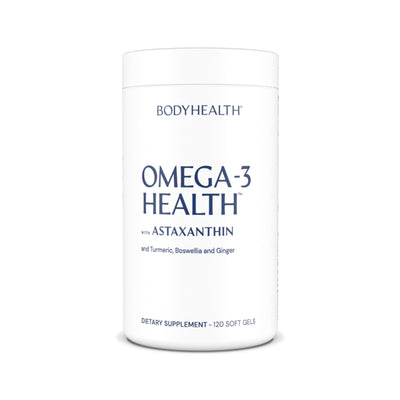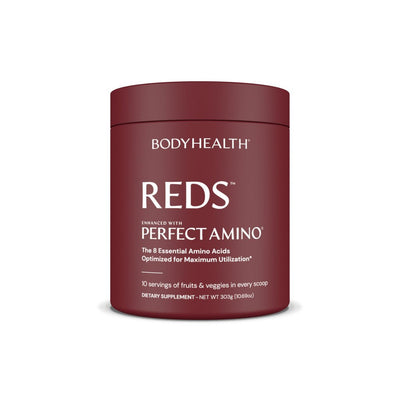Energy Drinks: Poor Sleep, Weight Gain & Low Energy
by Dr. David Minkoff July 05, 2023 5 min read

We’ve all seen energy drinks advertised on social media, by influencers, and even by athletes.
And the number of people drinking these on an almost daily basis has been growing for years, affecting their sleep, mood, nervous system, heart health, weight and overall health and energy levels.
Even some elite athletes have begun drinking them, causing trouble down the road.
These energy drinks have high amounts of caffeine, and higher amounts of straight sugar, often under the guise of several different ingredients so you don’t see quite how much is in there.
One even listed its 2nd and 3rd ingredients (after water) as “sugar, glucose...”
These are the same thing. But breaking them apart, as surprisingly few people know that glucose is sugar, makes it seem like there is less sugar in it.
And, while they list 160 mg of caffeine as an ingredient, other ingredients listed supply even more caffeine and other types of stimulants.
How much caffeine is actually in them? I don’t know. But much more than anyone needs, especially when they’ve usually already had a couple cups of coffee in the morning.
So let’s look at what they’re actually doing in the body, how they give that first energy high, then crash, and their effects down the line.
HOW ENERGY DRINKS & STIMULANTS ACTUALLY WORK
This could actually be titled: “How does caffeine or any stimulant work,” as this is it. Energy drinks are just doing it 4 or 5 times as much when compared to a cup of coffee or two.
It could also be called "How do we fall asleep" or "What prevents us from falling asleep" or "How does the Sleep/Wake cycle occur" or "Why am I so tired all time."
Here we go.
There is a molecule called Adenosine. We’ve talked about Adenosine Triphosphate, or ATP, the energy form created within our cells and used by our cells.
Oxygen and sugar (or amino acids or fats) enter the cells and specific organelles within the cell, called mitochondria, combine them to form ATP, the energy cells use.
But that’s Adenosine Triphoshate. Now we’re talking about just Adenosine.
Adenosine is a byproduct of many cellular processes, including the breakdown of ATP (adenosine triphosphate).
So, during the day your cells make Adenosine Triphosphate as energy.
The cells then use this energy, which releases the Adenosine.
The Adenosine then goes to the brain where its starts accumulating.
Now, Adenosine works as a neurotransmitter, a chemical messenger in the brain. As its levels increase, adenosine binds to what are called adenosine receptors (receivers).
This leads to a decrease in the release of neurotransmitters that promote wakefulness and arousal, as well as a decrease in adrenaline, which tells your body to make energy and be awake.
Instead, Adenosine leads to the release of GABA and serotonin, which calm us, bring on drowsiness, and allow us to go to sleep.
Adenosine actually helps you calm down, brings on sleep, and helps you maintain stable sleep.
It suppresses energy creation and use, and wakefulness.
Then, while you sleep, your body has a chance to clear adenosine from the brain, which is part of why you wake up feeling refreshed and alert.
Because Adenosine isn't there to suppress adrenaline, so it can be released so energy creation and use can start again and you can get ready for your day.
So, to recap, your cells make energy which they then use, releasing adenosine. This adenosine builds up in the brain gradually during the day, surrounding the adenosine receptors and gradually reducing adrenaline and energy production, until by the end of the day your body is ready for good deep sleep that it can maintain through the night until it’s time to get up again, at which point all of the adenosine is cleared out allowing wakefulness to occur again.
So what do energy drinks and caffeine do?
They block adenosine receptors so the adenosine can’t be seen by the receptors, causing adrenaline to continue to be released, so energy keeps being created and released.
So the GABA and serotonin aren't released, or nearly as much, and the body doesn't gradually calm down to sleep at night.
Now, this happens with a cup of coffee in the morning. That caffeine blocks some of the adenosine receptors so more adrenaline is being released.
But that’s just a small amount.
What about someone who has 2-3 cups of coffee in the morning, then a can or two of energy drinks later on in the day or even in the evening?
How is their sleep going to be?
How will they feel in the morning and how many more energy drinks will they need to get them through the next day, or the next?
You see, once the affects of the energy drink wear off, the crash comes.
They go from being super alert to… super not. Not alert, not fully awake, not high energy, not healthy, and often not thinking straight.
As these also affect the nervous system, which ties into the heart, we can start to see heart palpitations, panic attacks and more.
Heart Rate Variation (HRV) decreases (bad) and Resting Heart Rate (RHR) rises (also bad).
They also put stress on the kidneys and liver due to the toxins that have to be filtered out.
Beyond this, over time they can lower our immune function, cause slow recovery, disrupt our hormones and gut bacteria, affecting our mood and overall body function, and, of course, with the high amount of straight or processed sugars, they can cause significant weight gain while at the same time gradually slowing our metabolism so it’s harder to lose that weight afterwards.
Not that we’d have the energy to do so at that point.
But there’s one last thing they do we need to cover quickly.
It’s called adrenal fatigue.
ENERGY DRINKS CAUSE ADRENAL FATIGUE
As we covered above, Adenosine is released throughout the day, gradually building up in the brain and gradually suppressing energy creation and use so that by the end of the day we’re tired and ready for a good night’s sleep.
But what is this adenosine actually suppressing? The release of adrenaline.
It’s adrenaline and cortisol that are released in the morning to wake you up.
And they’re released because by that point the adenosine is cleared out of the brain and no longer suppressing their release.
It’s adrenaline that caffeine and sugar stimulate. They stimulate it’s release because it then instructs the cells to start making energy and the nervous system to go into action.
But when these high amounts of caffeine and stimulants are coming throughout the day, this adrenaline is constantly being released and your body can get sick of it. Or become unable to keep up with it.
And it can start producing less and less adrenaline.
And you need this adrenaline to tell your cells to make and use energy.
So overall energy levels start going down and you need more energy drinks to keep them up. And then more. And more.
Until they stop helping you at all.
The best thing you can do for high energy, endurance, and mental clarity, while also getting good, deep sleep is eat a diet consisting of natural, low-glycemic sugars that provide slow-burning, long-lasting energy, high amounts of amino acids, high amounts of healthy fats and Omega 3, take your vitamins, minerals and electrolytes, and get in daily exercise.
When one has all of these things in we see energy levels naturally begin to rise and rise.
And we also see health rising, proper sleep, hormones coming into balance and mood rising.
If you’d like to know more about what to do to achieve a lean, strong, healthy and high energy body, check out the Lean Bulk Program.
It’s probably exactly what you’ve been looking for.
READ THE NEXT ARTICLE IN THE SERIESArticles by Health Topic
Get “The Search for the Perfect Protein”
by Dr. David Minkoff
Signup for the BodyHealth Newsletter and get a FREE digital copy of "The Search for the Perfect Protien" by Dr. David Minkoff and discover the key to weight loss, depression, fatigue, insomnia, and osteoporosis!
*These statements have not been evaluated by the Food and Drug Administration. These products are not intended to diagnose, treat, cure, or prevent any disease.




